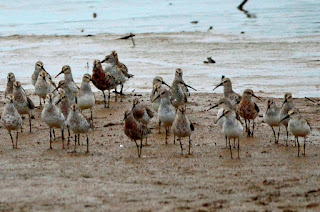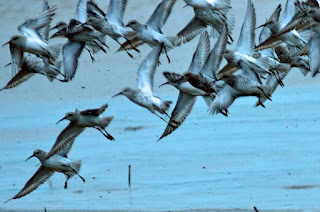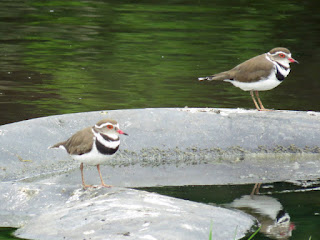Participants: Sandy Olver, Margaret Jones, Doug & Angie Butcher, Stanley & Asothie Gengan, Barrie Willis & Sue Hansbury, Graham & Sue Salthouse, Stan & Val Culley, Robin Eccles, Bob & Hazel van Rooyen
Species: 132 Text: Hazel van Rooyen
Monday: Arriving at St Lucia Wilds more or less all at the same time, we scuttled about off-loading luggage and quickly got settled in so that we could suss out our surroundings. Livingston’s Turaco and Yellow-rumped Tinkerbird competed for The Voice. We then visited the ski-boat club where the verandah overlooked the estuary. On the opposite side a Goliath Heron stood in the shallows along with Pink-backed Pelican, Grey Heron and Black-winged Stilts, amongst others. Taking the popular boardwalk brought us closer to more waders – African Spoonbill, Little Egret, Ruff, Whimbrel and White-winged Terns.
 |
| Pink-backed Pelican (photo HvR) |
 |
| An African Pipit skittered about the sand dunes (photo HvR) |
 |
| An immature African Fish Eagle hunted over the estuary (photo HvR |
 |
| A Spotted Flyctacher at our accommodation (photo HvR) |
Tuesday: In the morning we got an early start into Isimangaliso Wetland Park but Crested Guineafowl were even earlier, rushing hither and thither (as they do) around the grassy area outside our chalets. Once in the park, White-eared and Black-collared Barbets were very visible and soon Amethyst and Scarlet-chested Sunbirds along with Blue-cheeked Bee-eaters were showing off their iridescent plumage.
 |
| Scarlet-chested Sunbird (photo HvR) |
 |
| Blue-cheeked Bee-eater (photo HvR) |
 |
| Amongst all the activity, a Diederik’s Cuckoo caught a juicy caterpillar (photo HvR |
 |
| Woolly-necked Stork (photo HvR) |
The water had receded greatly since our last visit but following a loop we came to iZindondwe Pan which at first glance looked deserted but on closer inspection we picked up a Wood Sandpiper, African Jacana, Black Crake on the periphery while a Woolly-necked Stork peeped out of the tall sedges. A Black-chested Snake Eagle soared regally above us. Moving along, a family of Amur Falcons looked settled in a leafless tree and a few minutes later we drove passed a Brown Snake Eagle perched in another tree.
 |
| Amur Falcons (photo Stan Culley) |
 |
| Amur Falcon Male (photo HvR) |
 |
| Black-chested Snake Eagle (photo Stan Culley) |
 |
| Bushbuck (photo HvR) |
 |
| Relaxing at Mission Rocks (photo DB) |
 |
| Breakfast in a shady spot (photo Doug Butcher)) |
 |
| Breakfast (photo Doug Butcher) |
At Catalina Bay we stopped to enjoy the view. A pair of Buffalo stood drowsily cooling off in the lake. Bliss!
 |
| Buffalo enjoying a cool siesta (photo HvR) |
 |
| Brown Scrub-Robin (photo Stan Culley) |
Moving on to Cape Vidal, Cape & Pied Wagtail were busy amongst the holiday makers and a shy Brown Scrub Robin caught Stan’s sharp eyes. Driving back slowly via the Red dunes, Senegal Lapwing posed obligingly and a single Red-backed Shrike balanced on the telephone wires.
 |
| Senegal Lapwing (photo Stan Culley) |
 |
| Red-backed Shrike (photo HvR) |
 |
| View from Mission Rocks (photo HvR) |
A herd of Buffalo gazed lazily at us, chewing their cud and letting Red-billed Oxpeckers groom them.
 |
| Red-billed Oxpeckers (photo HvR) |
Later in the afternoon Stanley & Asothie, Bob and I took a walk in the iGwalagwala Forest which was next to our accommodation. We were looking for the African Broadbill which we actually found - hoorah! (Unfortunately no photo)
Assassin Bugs, in camouflage outfits, enjoyed an orange-coloured fruit. It was very humid after a very hot day and going round in circles, we almost got lost. We had just found the road when Barrie & Sue drove by on their way to the ski-boat club for drinks.
Thankfully he offered us a lift back and we all managed to get into his spacious new car.
 | ||||
| Assassin Bugs (photo HvR). |
Assassin Bugs, in camouflage outfits, enjoyed an orange-coloured fruit. It was very humid after a very hot day and going round in circles, we almost got lost. We had just found the road when Barrie & Sue drove by on their way to the ski-boat club for drinks.
Thankfully he offered us a lift back and we all managed to get into his spacious new car.
 |
| Yellow-breasted Apalis (photo HvR) |
 |
| Rudd's Apalis (photo HvR) |
Wednesday morning dawned sunny and breezy and the whole group gathered for another walk in the Forest. Black-backed Puffback and Square-tailed Drongo chortled and whistled and a Dark-backed Weaver performed somersaults in his immaculate yellow and black suit, swinging upside-down looking for tasty grubs. We were eyeing up several small birds flitting in the thicket when we realised one was the Woodward’s Batis. How thrilled were we! Another Lifer for most of us. The Rudd’s Apalis was another of the little darting birds along with Yellow-breasted Apalis.
 |
| Golden-tailed Woodpecker (photo HvR) |
A Golden-tailed Woodpecker squawked loudly and a Crowned Hornbill came to see greet us. Then we espied a pair of Yellow-bellied Greenbulls feeding two hungry chicks on a nest. That was very special.
In the open grassy area a beautiful Flame Tree was in full flower.
 |
| Yellow-bellied Greenbull chick (photo Sue Salthouse) |
In the open grassy area a beautiful Flame Tree was in full flower.
 |
| Natal Flame Tree (photo HvR) |
Home then to breakfast, after which most of us set off for a trip up the Western Shores. This was rather disappointing as regards birdlife except for a large flock of Collared Pratincoles on the dirt road which kept flying up as the vehicles approached, only to land a few paces further on, and nearly always facing away from us.
 |
| Collared Pratincole (photo HvR) |
A Wattled Lapwing and Common Fiscal were also seen. Arriving at the aerial boardwalk we were glad to have a snack break in a shady glade. The short boardwalk was very pretty with lovely views at the end. Intermediate Egrets were spotted and Barrie and Sue saw an African Marsh Harrier hunting over the reed beds. A Terrestrial Brownbul complained crossly from the understory.
 |
| Aerial Boardwalk (photo HvR) |
 |
| Aerial Boardwalk (photo HvR) |
 |
| Herd of Blou Wildebeest (photo HvR) |
 |
| Lilac-breasted Roller (photo Stan Culley) |
 |
| Martial Eagle (photo Doug Butcher) |
 |
| Pied Crow (photo Doug Butcher) |
On Thursday morning, our last day, we breakfasted first then ventured onto the beach dune walk, managing to see Curlew Sandpiper, White-fronted and Grey Plovers plus Little Stint but then the rain came down and we rushed for shelter beneath some bushes. It soon stopped and only a bit damp, some of us ventured further on but soon it started up again and eventually we had to give in and went home, wet tails between our legs, to get into dry clothes.
 |
| Wood Sandpiper (photo HvR) |
 |
| Common Ringed Plover (photo HvR) |
 |
| Wire-tailed Swallows (photo HvR) |
Then, taking a risk with the weather, some of us decided to give the estuary beach another chance. This was worth the effort, adding several species to our list – Swift Tern, Grey-headed Gull, Water Thickknee, and Lesser-crested Tern. We had a long return walk - all of two km’s but heavy going across the sand (especially for Stan with his scope) and eventually we called it a day and returned to those waiting patiently in the cars.
As we got home the rain started in earnest and didn’t let up till the following morning when we had to leave anyway. The guys still managed to braai and they must be thanked for cooking for us every night. Also thanks to Imelda and her team at St Lucia Wilds for making us so at home. The units lacked for nothing and everything worked! The swimming pool was most welcome too. We didn’t see the hippo which sometimes takes a short cut through their property but Sue & Barrie encountered him (or her) on the street on their way to their accommodation one dark and lonely night - must have been a shock.
 |
| Top R: Swift Tern/ Middle L: Lesser Crested Tern (photo HvR) |
 |
| Swift Terns (photo HvR) |
 |
| Grey-headed Gull (photo HvR) |
 |
| Intrepid bird watchers (photo HvR) |
 |
| Water Thick-knee (photo HvR) |
 |
| Caspian Terns (photo HvR) |
 |
| Curlew Sandpipers, transitioning into breeding plumage (photo HvR) |
As we got home the rain started in earnest and didn’t let up till the following morning when we had to leave anyway. The guys still managed to braai and they must be thanked for cooking for us every night. Also thanks to Imelda and her team at St Lucia Wilds for making us so at home. The units lacked for nothing and everything worked! The swimming pool was most welcome too. We didn’t see the hippo which sometimes takes a short cut through their property but Sue & Barrie encountered him (or her) on the street on their way to their accommodation one dark and lonely night - must have been a shock.
Thanks to all participants and helped make the trip so pleasant and share their vast knowledge, especially Stan Culley. Everyone agreed that it was a successful trip. Stan commented that overall some species were conspicuous by their absence, such as flycatchers, mannikins and waxbills. Graham must have got the most Lifers – at least 19-plenty! He still didn’t get his “Tufted" Flufftail (and mostly likely never will) but he gave us a lot of laughs. I wonder what our next trip holds.
 |
| Curlew Sandpipers take off (photo HvR) |
 |
| A swirl of Sandpipers (photo HvR) |
 |
| Searching ... searching (photo Doug Butcher) |
 |
| Visibility was poor (photo Doug Butcher) |
 |
| Straggling along (photo HvR) |
 |
| Drinks at the ski-boat club (photo by waiter) |
 |
| 4 Caspian Terns & 1 Swift Tern (photo Doug Butcher) |
Bird List
| Apalis, Rudd’s Apalis, Yellow-breasted Barbet, Black-collared Barbet, Crested Barbet, White-eared Batis, Woodwards Bee-eater, Blue-cheeked Bee-eater, European Bee-eater, Little Bee-eater, White-fronted Boubou, Southern Broadbill, African Brownbull, Terrestrial Bulbul, Dark-capped Bush-shrike, Gorgeous Bush-shrike, Orange-breasted Cameroptera, Green-backed Canary, Brimstone Canary, Yellow-fronted Cisticola, Croaking Cisticola, Rattling Cisticola, Zitting Cormorant, Reed Cormorant, White-breasted Coucal, Burchell’s Crake, Black Cuckoo, Diederick’s Cuckoo, Klaas’s Cuckooshrike, Grey Dove, Emerald-spotted Dove, Red-eyed Drongo, Fork-tailed Drongo, Square-tailed Duck, White-faced Duck, Yellow-billed Eagle, African Fish Eagle, Black-chested Snake Eagle, Brown, Eagle, Martial Egret, Intermediate Egret, Little Falcon, Amur Fiscal, Common Fly-catcher, Spotted | Goose, Egyptian Goose, Spurwing Greenbul, Sombre Greenbul, Yellow-bellied Guineafowl, Crested Guineafowl, Helmeted Gull, Common Gull, Grey-headed Harrier, African Marsh Hawk, African Harrier Heron, Goliath Heron, Grey Heron, Purple Honeyguide, Greater Hornbill, Crowned Hornbill, Trumpeter Ibis, Hadedah Jacana, African Kingfisher, Brown-hooded Kingfisher, Pygmy Lapwing, Blacksmith Lapwing, Senegal Lapwing, Wattled Longclaw, Yellow-throated Martin, Banded Martin, Sand Oxpecker, Red-billed Pelican, Pink-backed Pipit, African Plover, 3-banded Plover, Common Ringed Plover, Grey Plover, Kitlitz Plover, White-fronted Pratincole, Collared Prinia, Tawny-flanked Puffback, Black-backed Robin, Brown Scrub Robin-Chat, Red-capped Roller, European Ruff Sanderling Sandpiper, Curlew Sandpiper, Wood | Saw-wing, Black Shrike, Red-backed Shrike Sparrow, Grey-headed Sparrow, House Spoonbill, African Starling, Black-bellied Stilt, Black-winged Stint, Little Stork, Saddle-billed Stork, Woolly-necked Sunbird, Amethyst (M&F) Sunbird, Collared Sunbird, Grey Sunbird, Olive Sunbird, Purple-banded Sunbird, Scarlet-chested Swallow, Barn Swallow, Wire-tailed Swamphen, African Swift, African Palm Swift, Common Swift, Little Swift, White-rumped Teal, Red-billed Tern, Caspian Tern, Common Tern, Lesser-crested Tern, Little Tern, Sandwich Tern, White-winged (black) Thickknee, Water Tinkerbird, Yellow-rumped Turaco, Livingston’s Turaco, Purple-crested Wagtail, Cape Wagtail, Pied Weaver, Dark-backed Weaver, Spectacled Weaver, Thick-billed Whimbrel, Common Whydah, Pin-tailed Woodpecker, Golden-tailed |
| All photos property of photographers |









No comments:
Post a Comment